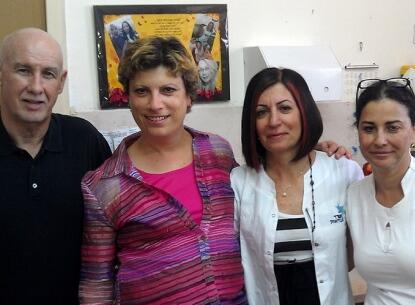
July 26, 2013
Nursing Professor Aids Bedouin in Israel
Share this story
In the Negev Desert region of Israel, many remote villagers have special health needs that require long treks through the desert heat or freezing winter winds to catch a bus to the nearest big city for treatment. Linda Haddad, Ph.D., associate professor in the VCU School of Nursing’s Department of Adult Health and Nursing Systems, is helping to assess these needs with the goal of improving access to health among the tribal populations.
Haddad, a native of Jordan, recently returned from the southern region of Israel, where she used her cultural and public health expertise on behalf of Project HOPE, a global health and disaster relief organization. Haddad conducted a public health needs assessment among the Bedouin, a unique social group within the Arab society. Bedouin are nomadic indigenous people who have lived in tribal communities for centuries.
Sixty-five percent of Bedouin families live below the poverty line, according to Haddad. Although families with children receive child support allowances from the government, the economic gap between the Bedouin and the Israeli Jewish population remains very high.
Since half of the Bedouin families live in villages that are not recognized by the government and lack crucial services such as running water, sanitation, electricity and access roads, they face many health challenges, Haddad said. Few health clinics exist in the region, and the ones that do lack medications for chronic disease.
“Such conditions are associated with higher rates of illness, hospitalization and mortality for infectious diseases among Bedouin children than Jewish children,” Haddad said. “Also, many Bedouin children under the age of 5 suffer from growth delays.”
Other needs include school nursing and physiotherapy for deaf and hearing specialties, Haddad said.
“Many children are handicapped and many have deformities due to intermarrying,” she added.
Haddad said a shortage of government organizations can enter the region and help. Recognizing the need, Project HOPE is partnering with Israel to deploy United States volunteer health care specialists to target Ministry of Health areas of interest, she said.
Haddad is no stranger to working on international health initiatives with Project HOPE and other agencies. She has worked with the organization since 2006 on several projects, including the training of Iraqi nurses and doctors in Jordan for a newly established children’s hospital in Iraq.
During her five-day trip to Israel, Haddad was the only nurse among the Project HOPE delegation. They traveled to several recognized and unrecognized tribal communities, despite the potential danger.
“It was unsafe when we went to one of the villages because of Bedouin violence and criminal activities phenomena,” she recalled. “They had to guard us. Police with big guns were walking with us.”
Haddad said she completed the public health assessment and is planning to help Project HOPE screen nurses who want to volunteer to work with other Bedouin in Israel.
“There is a severe need for public health nurses in the region who understand the culture and who speak Arabic and Hebrew,” she said.
Subscribe for free to the weekly VCU News email newsletter at http://newsletter.news.vcu.edu/ and receive a selection of stories, videos, photos, news clips and event listings in your inbox every Thursday.
Subscribe to VCU News
Subscribe to VCU News at newsletter.vcu.edu and receive a selection of stories, videos, photos, news clips and event listings in your inbox.










